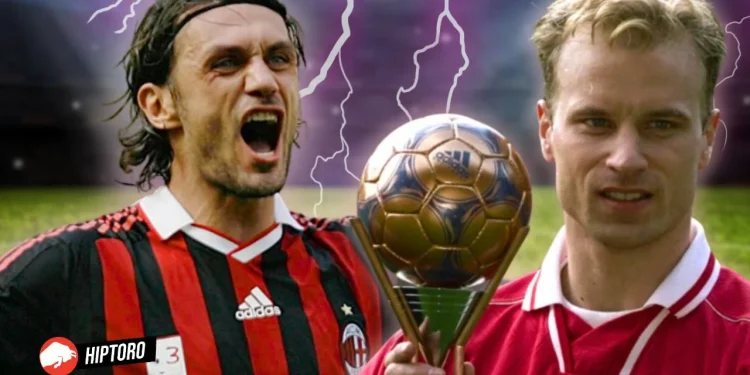The drama of a penalty shootout is one of the most nerve-wracking, exhilarating aspects of soccer. This method of deciding a tied game — typically in the knockout stages of tournaments — pits players against goalkeepers in a direct, high-pressure confrontation that often leads to unforgettable moments. The penalty shootout not only tests the skills and nerves of the players but also leaves an indelible mark on the memories of fans around the world.
Over the years, several shootouts have stood out for their intensity, unexpected outcomes, and the sheer emotional rollercoaster they’ve provided for players and spectators alike. This article explores the top 10 most dramatic penalty shootouts in soccer history, examining each for its context, key moments, and the legends it created.
Here are the Top 10 Most Dramatic Penalty Shootouts in Soccer History
1. The 1986 World Cup Quarter-Final: France vs Brazil
The 1986 World Cup quarter-final between France and Brazil is often remembered as one of the most thrilling encounters in the history of the tournament. Held at the Estadio Jalisco in Guadalajara, Mexico, the match brought together a French team brimming with talent, including Michel Platini, Jean Tigana, and Alain Giresse, and a Brazilian squad featuring such stars as Sócrates, Zico, and Careca. This match was a showcase of skill, strategy, and sheer passion for the game.
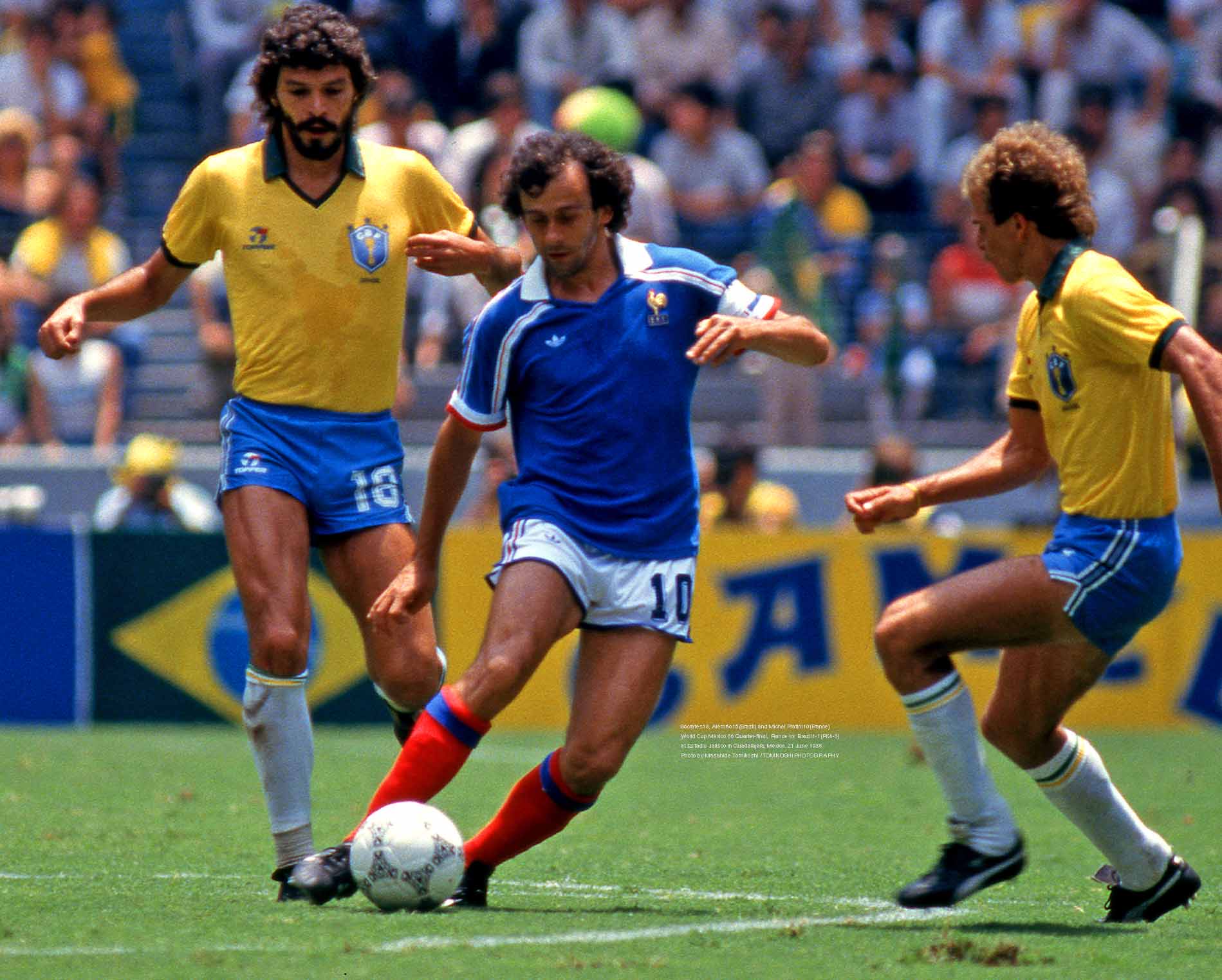
During the match, France and Brazil exhibited some of the most fluid and attacking football of the tournament. Brazil took the lead through Careca, which was soon neutralized by a Platini penalty, leveling the score at 1-1. As the game progressed past regulation and into extra time, both teams had chances to seal the victory but were denied by superb goalkeeping and defense. The match ultimately proceeded to a penalty shootout, a nerve-wracking conclusion to a fiercely contested game.
In the shootout, Brazilian captain Sócrates missed the first penalty, giving France an early advantage. However, this was quickly countered when Platini, France’s captain, also missed his shot. The subsequent rounds were tense, with each team scoring and missing under immense pressure. The decisive moment came when French goalkeeper Joël Bats saved Julio Cesar’s penalty, allowing Luis Fernandez to slot home the winning penalty for France.
This victory was not just a sports win; it was a cultural moment for France, affirming their status as a European football powerhouse and setting the stage for future successes, including their 1998 World Cup and 2000 European Championship wins. For Brazil, it was a heartbreaking loss, leading to a period of introspection and changes in their approach to international football.
2. The 2005 UEFA Champions League Final: AC Milan vs Liverpool
The 2005 UEFA Champions League final in Istanbul is etched in the memories of football fans for Liverpool’s incredible comeback and the dramatic penalty shootout that concluded the match. AC Milan were the clear favorites, boasting some of the world’s finest players like Paolo Maldini and Kaka, and they demonstrated their class as they raced to a 3-0 lead by halftime with goals from Maldini and a brace from Hernan Crespo.
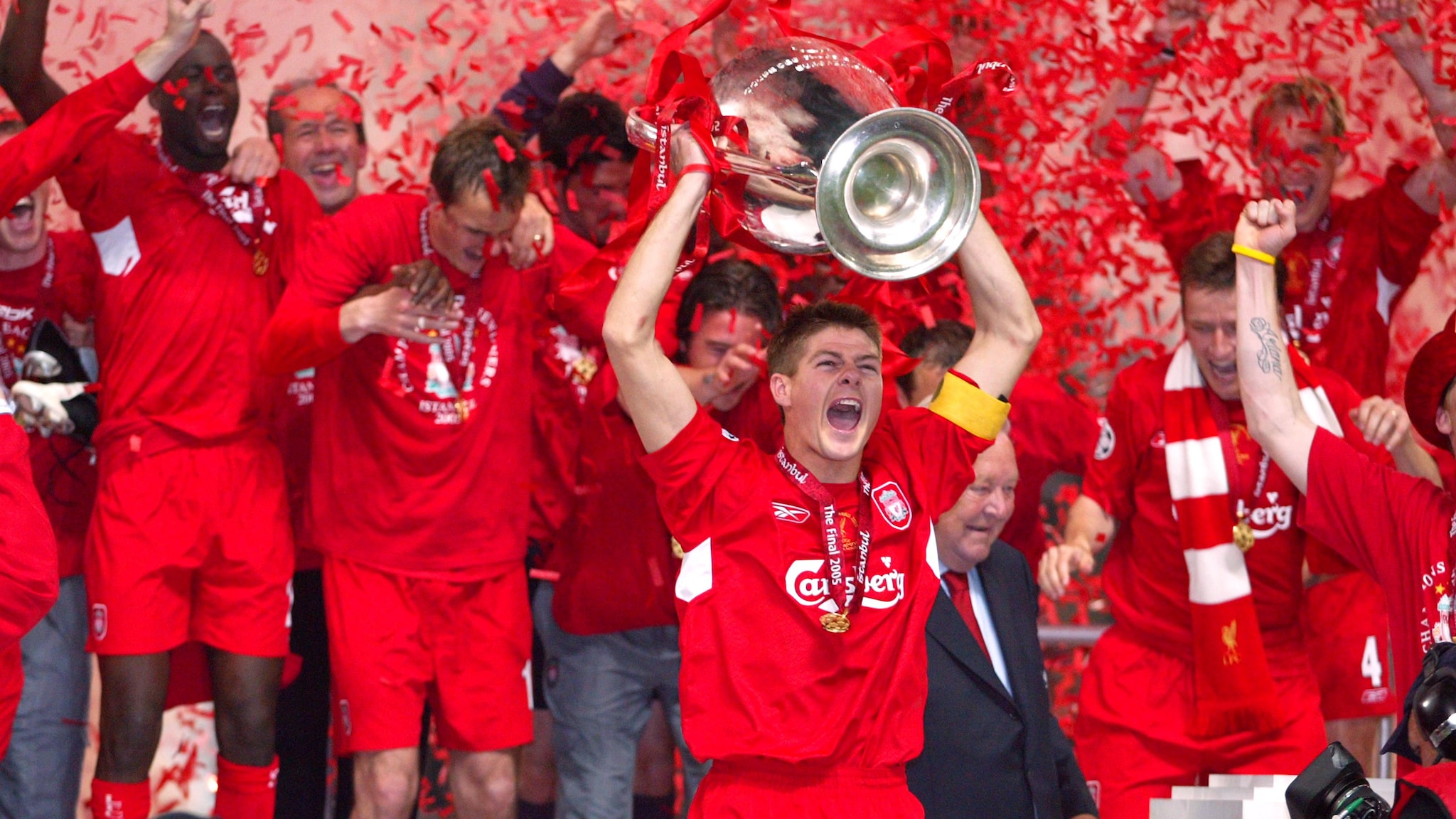
However, the second half saw a transformed Liverpool team take to the field. Inspired by their captain Steven Gerrard, Liverpool struck three times in less than six minutes, with goals from Gerrard, Vladimir Smicer, and Xabi Alonso, bringing the score to 3-3. The match then went into extra time, where both teams had chances, but it remained deadlocked, leading to a penalty shootout.
Liverpool goalkeeper Jerzy Dudek was the hero of the shootout, saving penalties from Andrea Pirlo and Andriy Shevchenko, while Milan’s goalkeeper Dida could only stop John Arne Riise’s effort. The final penalty by Shevchenko, which Dudek saved, completed one of the most remarkable comebacks in the history of football. This win gave Liverpool their fifth European title and has since been a source of legend and lore among Liverpool fans and football enthusiasts worldwide.
3. The 1994 World Cup Final: Brazil vs Italy
The 1994 World Cup final between Brazil and Italy was a clash of two footballing giants and is notably remembered for being the first World Cup final to be decided by a penalty shootout. The match was played at the Rose Bowl in Pasadena, California, under intense heat, which contributed to a cautious and tactical game, with both teams wary of making mistakes.

Throughout the match, both Brazil and Italy had opportunities to score, with players like Romário for Brazil and Roberto Baggio for Italy coming close. However, defenses held firm, and the game ended 0-0 after extra time, leading to the first penalty shootout in a World Cup final. The tension was palpable, and the pressure immense, particularly on the players tasked with taking the penalties.
In the shootout, Brazil scored their first three penalties, while Italy missed one. The pivotal moment came when Roberto Baggio, Italy’s star player who had carried his team through the tournament, stepped up to take the final penalty. In a shocking turn of events, Baggio skied the ball over the crossbar, handing Brazil their fourth World Cup title. This moment is famously captured in images of Baggio, hands on hips, looking in disbelief, which have since become iconic in the world of sport. This victory reaffirmed Brazil’s status as a footballing superpower, while Italy was left to rue what might have been.
4. The 2012 Champions League Semi-final: Chelsea vs Barcelona
The 2012 Champions League semi-final between Chelsea and Barcelona is remembered as one of the most strategic and dramatic encounters in the competition’s history. Chelsea, under interim manager Roberto Di Matteo, faced a Barcelona team considered one of the best in the history of football, led by Pep Guardiola. The tie was not only a clash of styles but also a battle of resilience against flair.

The first leg at Stamford Bridge saw Chelsea securing a narrow 1-0 victory with a crucial goal from Didier Drogba. The return leg at Camp Nou was where the real drama unfolded. Despite having John Terry sent off early in the game, Chelsea managed to fight back from 2-0 down with goals from Ramires and Fernando Torres, ending the match 2-2 and winning the tie 3-2 on aggregate.
The penalty shootout, though not a part of this tie, symbolically represents the level of suspense and nail-biting tension that the match carried. Chelsea’s performance was a testament to their tactical discipline and mental toughness. The victory was particularly significant as it propelled Chelsea to their first Champions League title, cementing their status among Europe’s elite. This match is often cited as a perfect example of the unpredictability of football and the importance of resilience and strategy over mere possession and flair.
5. The 2006 World Cup Quarter-final: England vs Portugal
The 2006 World Cup quarter-final between England and Portugal was steeped in controversy and drama, making it one of the most memorable matches of the tournament. Played in Gelsenkirchen, Germany, the game saw England’s hopes dashed in a penalty shootout after a goalless draw that was overshadowed by Wayne Rooney’s infamous red card for stamping on Ricardo Carvalho, an incident that also involved his Manchester United teammate Cristiano Ronaldo.
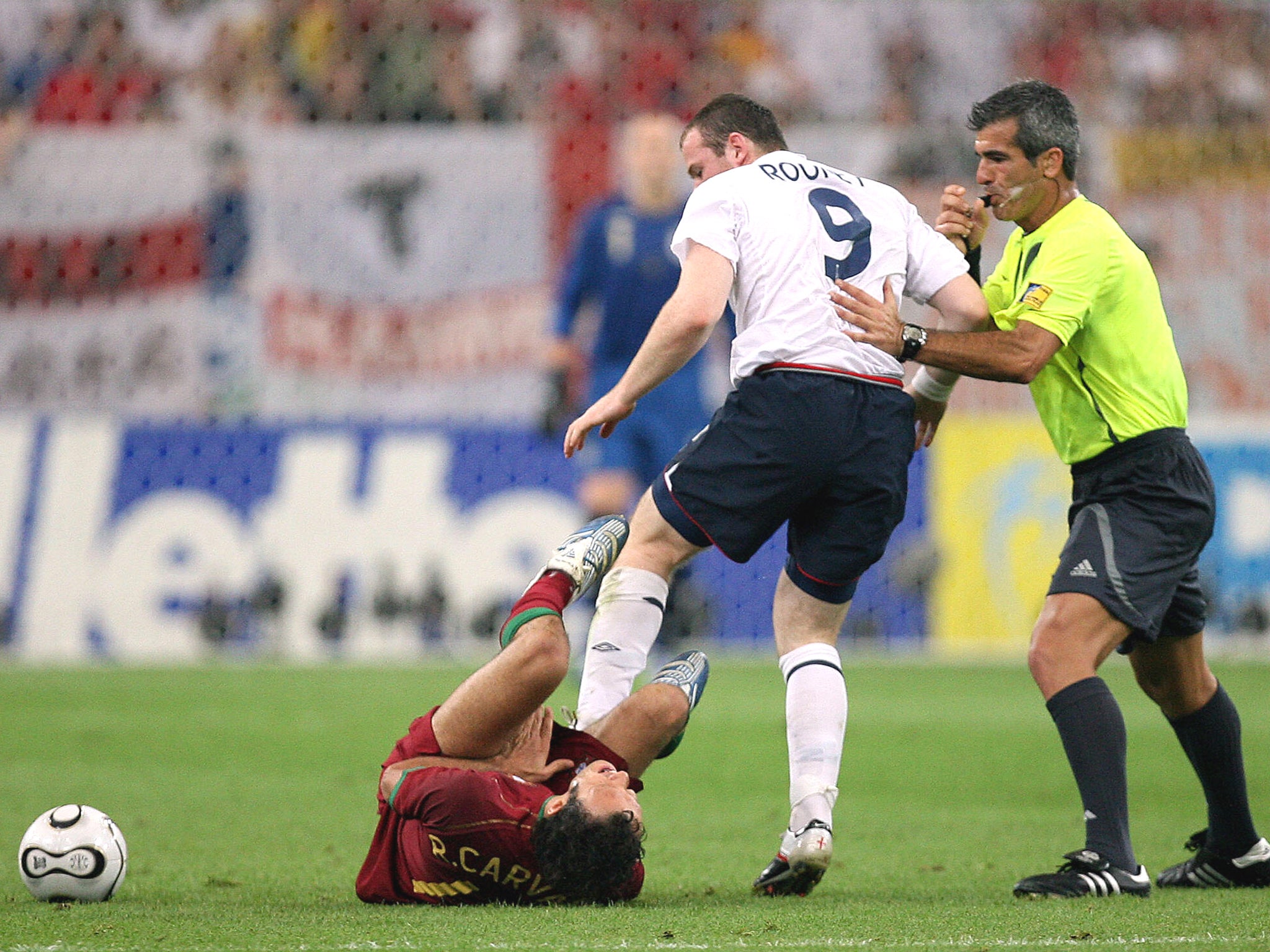
The subsequent penalty shootout was a display of nerves and missed opportunities by England. Frank Lampard, Steven Gerrard, and Jamie Carragher all missed their penalties, with Portuguese goalkeeper Ricardo making crucial saves. The shootout ended 3-1 in favor of Portugal, marking another chapter in England’s long history of penalty shootout woes in major tournaments. This match highlighted the psychological barriers that seemed to plague England in crucial moments, while for Portugal, it was a testament to their growing stature in international football, showcasing their ability to prevail in tense situations.
6. The 1992 European Championship Semi-final: Netherlands vs Denmark
The 1992 European Championship semi-final saw Denmark continue their unexpected and fairy-tale journey in the tournament by facing the Netherlands, one of the favorites and reigning champions. The match itself was a thrilling encounter, ending 2-2 after extra time, with Denmark’s Henrik Larsen scoring twice and the Dutch responding through Dennis Bergkamp and Frank Rijkaard.

The penalty shootout that followed is often remembered for Danish goalkeeper Peter Schmeichel’s heroics and the decisive missed penalty by Marco van Basten. Schmeichel saved Van Basten’s kick, allowing Kim Christofte to score the winning penalty for Denmark. This victory was not just a sports triumph but a national fairy tale for Denmark, as they went on to win the tournament against all odds. This shootout is remembered as a defining moment in Danish football, illustrating the impact of unity and team spirit against seemingly insurmountable odds.
7. The 2001 UEFA Cup Final: Liverpool vs Alavés
The 2001 UEFA Cup final between Liverpool and Alavés was a thrilling encounter that ended dramatically and unconventionally. Liverpool, under manager Gérard Houllier, were in pursuit of a treble that season, having already won the League Cup and the FA Cup. The match against Alavés, a relatively small Spanish club making their first appearance in a European final, was a goal fest, ending 5-4 in favor of Liverpool after extra time.

The match ended with a golden goal, an own goal by Delfí Geli, which came from a free-kick taken by Gary McAllister. While technically not decided by a penalty shootout, the intense back-and-forth nature of the game mirrored the suspense and immediate consequences of a shootout. This victory highlighted Liverpool’s resurgence as a dominant force in English and European football, while for Alavés, despite the loss, the final represented the pinnacle of the club’s achievements on the European stage.
8. The 1999 Copa America Quarter-final: Brazil vs Argentina
The 1999 Copa America quarter-final between Brazil and Argentina was yet another chapter in the storied rivalry between these two South American footballing giants. The match itself was a tightly contested affair, ending 1-1 in regulation time. The game saw intense physical play and strategic maneuvers, highlighting the deep-seated competitive nature between the two nations.

When the match proceeded to penalties, the tension could not have been higher. Dida, Brazil’s goalkeeper, was the standout performer in the shootout, saving two crucial penalties that helped seal a 4-2 victory for Brazil. His saves against Argentine attempts were not just physical stops but psychological blows, shifting the momentum firmly in Brazil’s favor. The shootout win for Brazil was more than just a victory; it was a statement of dominance in the regional rivalry, emphasizing Brazil’s mental edge over Argentina in crucial moments.
This victory was significant in reinforcing Brazil’s status as a powerhouse in South American football. It also underscored the psychological aspects of football, where confidence and composure under pressure can determine the outcome of critical matches. The match remains a memorable example of the intensity and passion that define the Brazil-Argentina rivalry.
9. The 2014 World Cup Round of 16: Brazil vs Chile
The 2014 World Cup Round of 16 match between Brazil and Chile was one of the most emotionally charged encounters of the tournament. Held in Belo Horizonte, Brazil, the match was part of Brazil’s quest to win the World Cup on home soil, adding immense pressure to the Brazilian players. The game ended 1-1, with goals from David Luiz and Alexis Sanchez, leading to a nail-biting penalty shootout.

The shootout was a rollercoaster of emotions, with each penalty kick accompanied by an outpouring of emotion from players and fans alike. Brazilian goalkeeper Júlio César became a national hero, saving two penalties and setting the stage for a dramatic win. The climax came when Gonzalo Jara’s final penalty for Chile hit the post, resulting in a mixture of Brazilian joy and Chilean despair.
This shootout not only advanced Brazil to the next round but also momentarily united the nation, providing a brief relief from the criticisms and pressures surrounding the team. The victory, however, was bittersweet, as it was followed by Brazil’s infamous 7-1 defeat to Germany in the semifinals. The match against Chile, particularly the shootout, highlighted the thin line between triumph and disaster in football, showcasing the intense emotional dynamics involved in the World Cup.
10. The 1996 European Championship Semi-final: Germany vs England
The semi-final of the 1996 European Championship between Germany and England is one of the most famous penalty shootouts in football history, not least because of its setting in Wembley Stadium, London. The match ended 1-1 after extra time, with goals from Alan Shearer for England and Stefan Kuntz for Germany. The game was a hard-fought battle, exemplifying classic European football with tactical discipline and physical intensity.
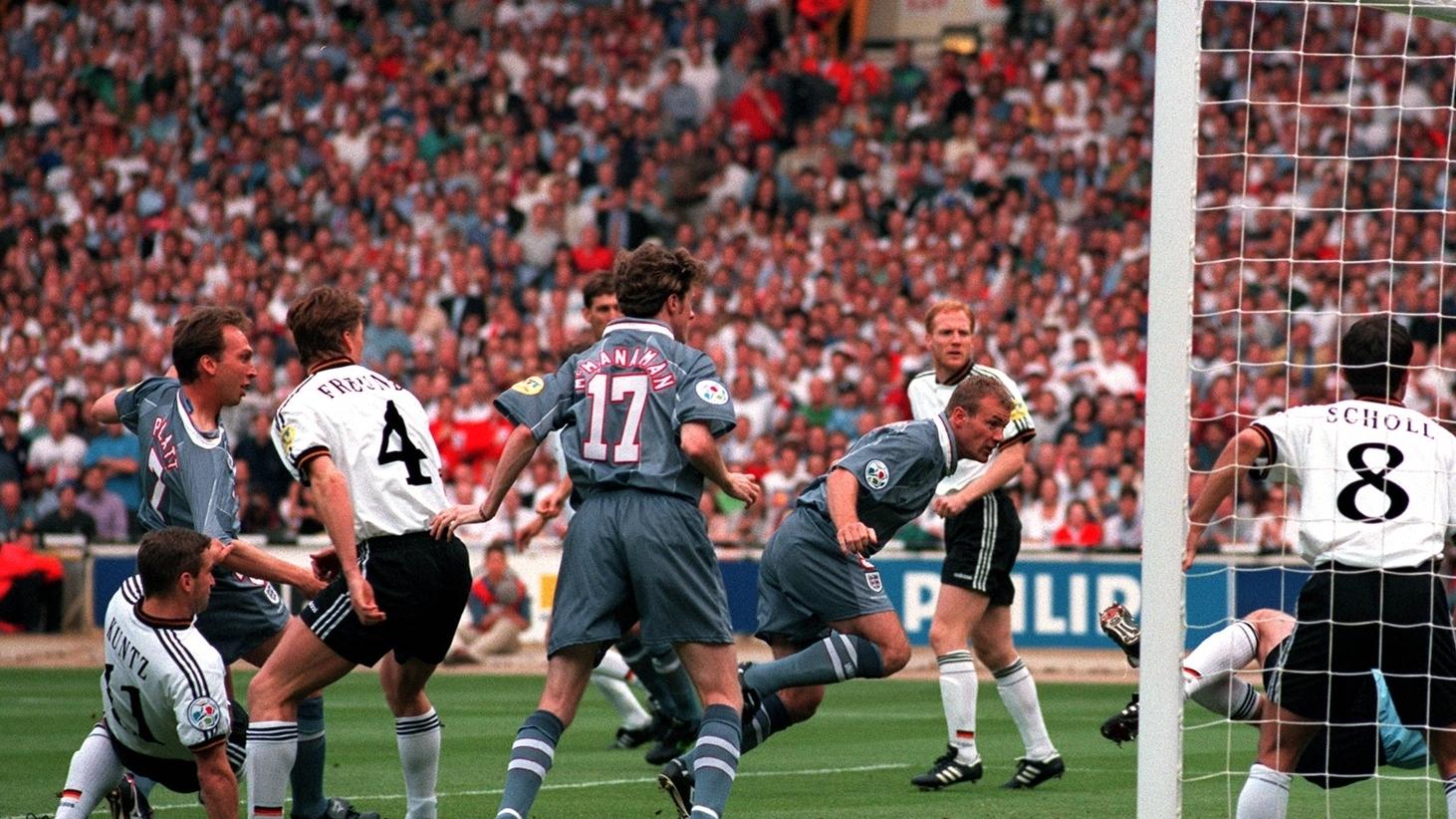
The subsequent penalty shootout is particularly remembered for its dramatic conclusion. After successful penalties from both sides, the shootout moved to sudden death. Gareth Southgate, a reliable defender for England, took the sixth penalty for his team but saw his shot saved by German goalkeeper Andreas Köpke. When Andreas Möller converted the next penalty for Germany, it sealed England’s fate and sent Germany into the final, which they would go on to win.
This match has become an enduring symbol of England’s “penalty curse,” reflecting broader national anxieties about failure in crucial moments. For Germany, the victory reinforced their reputation for efficiency and mental toughness in tournaments, traits that have defined German football for decades. The shootout remains a poignant memory for English football fans and a celebrated moment in German sporting history, illustrating the dramatic highs and lows that can coexist in football.
The Enduring Impact of Dramatic Penalty Shootouts in Soccer History
Penalty shootouts stand as some of the most intense and emotional moments in soccer, encapsulating not just the drama of the sport but also its unpredictability and capacity to stir deep national feelings. The ten shootouts discussed exemplify how these moments are more than just a method for deciding ties; they are historical events that have shaped the narratives and legacies of the teams and players involved.
The Psychological Impact
Penalty shootouts exert a unique psychological pressure, transforming them into profound tests of focus and nerve. Players must manage not only their skills but also their emotions, often under the weight of intense national expectations. The 1994 World Cup Final and the 1996 European Championship semi-final exemplify how the outcomes of shootouts can define careers—highlighting heroes like Brazilian goalkeeper Cláudio Taffarel and villains such as Roberto Baggio, whose missed penalty is still discussed with a sense of what might have been.
National Pride and Pain
These shootouts also reflect the highs and lows of national pride. For Brazil in 1994, the shootout win was a restoration of their footballing identity, confirming their status as the world’s premier footballing nation.
Conversely, for England in 1996 and again in 2006, penalty failures became a source of national angst, reinforcing a narrative of underachievement on the international stage.
The collective joy of victory and the shared agony of defeat not only bring fans and players together but also often lead to a period of national introspection and sometimes even change in sporting approaches.

Moments That Shape Footballing Philosophy
The outcomes of these shootouts have had significant implications for the tactical and strategic philosophies of teams. After their 1986 World Cup exit, Brazil moved towards a more European, defensively robust style, while maintaining their flair in attack. Similarly, England’s repeated failures in shootouts have led to a greater focus within the country on mental toughness and penalty preparation, which was evident in their recent successes in the 2018 World Cup and the 2021 UEFA Euro.
Heroes and Legends
Football legends are often born in the crucible of these high-pressure moments. Figures like Liverpool’s Jerzy Dudek and Chelsea’s Petr Čech have etched their names into club folklore through their shootout heroics. These players not only changed the course of matches but also inspired countless young fans and aspiring goalkeepers. The ripple effects of their performances are seen in the prioritization of psychological resilience in goalkeeper training programs worldwide.
The Role of Chance
Amidst all the skill and preparation, chance also plays a critical role in shootouts. The thin margins between success and failure are often down to moments that are as much about luck as they are about technique or mental strength. This element of randomness adds to the drama and allure of penalty shootouts, making them some of the most unpredictable and exciting moments in sports.
A Reflection of the Beautiful Game
Ultimately, penalty shootouts encapsulate the essence of soccer, a game of passion, pride, and profound unpredictability. They remind us that for all the tactics and physical prowess, football retains an element of the unknowable, where heroes and heartaches are only a kick away. These shootouts are not just about winning or losing; they are dramatic narratives that resonate across generations, fueling debates and discussions about the greatest moments and players in soccer history.
As we look back on these iconic penalty shootouts, we see more than just individual moments of triumph or despair. We witness a reflection of the cultural, social, and emotional tapestry that makes soccer the world’s most beloved sport. Each shootout tells a story of a particular time and place in football history, offering insights into the human experience at its most dramatic and revealing the deep communal bonds fostered by this global game.
These episodes serve as powerful reminders of why football is so deeply embedded in the cultural consciousness of nations around the world. They are snapshots of human emotion, from the ecstasy of a winning kick to the agony of a miss, each adding to the rich folklore of the beautiful game. Whether it is the joy of Brazilian fans in 1994, the English despair in 1996, or the collective awe at Liverpool’s 2005 miracle, these moments are immortalized in the collective memory of football fans, continuing to inspire and ignite passions in ways few other sports can.


